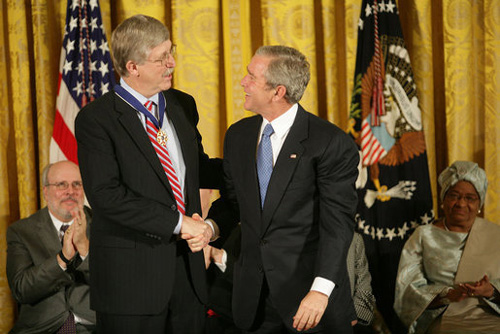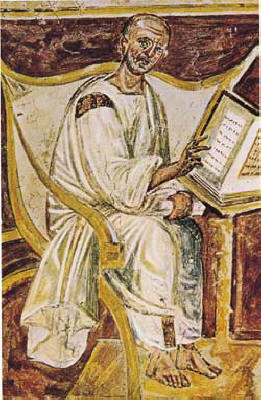Reason in All Things
Today, Augustine, Galileo, and the human genome. The University of Houston's College of Engineering presents this series about the machines that make our civilization run, and the people whose ingenuity created them.
I recently found myself drawn to a book by Francis Collins. You may recognize the name. He headed the international, publicly funded effort to map the human genome. That monumental effort was completed in April of 2003. We now have a human blueprint, expressed in the language of DNA.

What caught my eye was the book's title, The Language of God. In it, Collins describes his transformation from atheist to believer — a Christian in particular. And there, front and center, is the double helix of DNA — God's language, so to speak.
It's an interesting position. Viewing humankind as a string of chemical bits and bytes isn't something most people point to as a foundation for their spiritual beliefs. Even more, compare the human genome with that of other animals, and the similarities are striking. Collins, and many others, believe these similarities are strong evidence in favor of evolution — in fact, the strongest evidence available.
So how does Collins square this belief with the book of Genesis? That humankind was made apart from the other animals? Here, Collins turns to one of the great scholars of early religious thought, Saint Augustine.

Augustine wrote extensively on how Genesis should be interpreted. His conclusion? "Not literally." But what's even more interesting is what he has to say about reason.
"Usually, even a non-Christian knows something about the earth," wrote Augustine, "the heavens … animals, shrubs, stones, and so forth, and this knowledge he holds to … from reason and experience … Now, it is a disgraceful and evil thing for a non-believer to hear a Christian … talking nonsense on these topics; and we should take all means to prevent such an embarrassing situation … the shame is not so much that an ignorant individual is derided, but [that] … the writers of our Scripture are criticized and rejected as unlearned men." To the devoutly religious Augustine, belief had to fit the facts, not the other way around.
Nor was Augustine alone in his conviction. Copernicus, Kepler, Newton, Pasteur, Einstein — men who shook our perceptions of the world. Each had spiritual convictions. Yet none would ever ignore the facts at his disposal.
Perhaps the most direct observation comes to us from Galileo, a devout Christian to his death, even as the Church imprisoned him for heresy. "I do not feel obliged to believe that the same God who has endowed us with sense, reason, and intellect," said Galileo, "has intended us to forgo their use."

I'm Andy Boyd at the University of Houston, where we're interested in the way inventive minds work.
For related episodes, see, among others, A BRAIN RADIATOR, WALLACE'S LINE, SOAPY SAM AND HUXLEY, DARWIN AND THE BIBLE, and EVOLUTION IN 1944.
F. Collins. The Language of God. New York: Free Press, 2006.
The quotations from Augustine and Galileo are taken from Collins, pp. 156-158, where they are referenced as:
Augustine. Genesis 19:39.
Galileo. Letter to the Grand Duchess Christina, 1615.
The pictures of Galileo and Augustine are from Wikimedia Commons. The picture of Francis Collins is taken from a government web site.